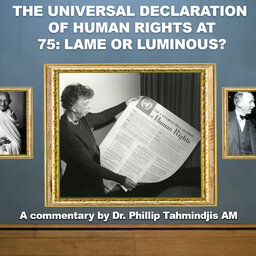Evolutionary or Revolutionary (II): What were the Reactions to the American & French Revolutions?
This episode considers the similarities and differences between the US and French revolutions and the resulting Declarations, and the reactions outside the United States and France to these.
While some applauded the new focus on rights, others were appalled at the bloodshed, particularly that occurring in France during the Terror. Thus, while some, like Thomas Paine, built on Locke’s ideas of natural rights, others, like Edmund Burke, were wary of them because of their connection to anarchy and so opposed reform. Yet others, like Jeremy Bentham, who was in favour of reform and did propose reforms in many areas, nevertheless called natural rights “nonsense on stilts”. This was the so-called Age of Reason, but theories were not uniform and, moreover, vied with observed and bloody facts.
This was also an age when women’s opinions began not only to be published but also read widely. So the discussion of persons of interest in the development of rights includes several examples of prominent women to see how their lives, upbringing and personalities contributed to and affected their views, as well as affecting the opinions of others in the growing debate about rights.
 THE UNIVERSAL DECLARATION OF HUMAN RIGHTS AT 75: LAME OR LUMINOUS?
THE UNIVERSAL DECLARATION OF HUMAN RIGHTS AT 75: LAME OR LUMINOUS?


